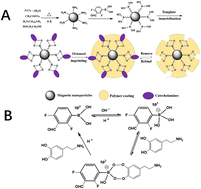Efficient synthesis of boronate affinity-based catecholamine-imprinted magnetic nanomaterials for trace analysis of catecholamine in human urine
Abstract
Catecholamines, a class of cis-diol-containing compounds, play a major role in the central nervous system. Meanwhile, catecholamines can be used as specific markers for some diseases in clinical diagnostics. Thus, it is important to determine catecholamines in real samples such as serum, plasma and urine. However, direct analysis of catecholamines in these samples is quite difficult because of their very low concentration level and the presence of undesirable matrix effects. It is essential to develop highly efficient extraction materials for the selective enrichment of catecholamines. Molecularly imprinted polymers have been well used for the selective enrichment for various kinds of molecules. In this study, we have developed dopamine-imprinted magnetic nanoparticles for selective enrichment of dopamine, followed by direct absorbance determination. The dopamine-imprinted magnetic nanoparticles were prepared according to boronate affinity-based surface imprinting. Magnetic nanoparticles and boronic acid ligands were used as supporting materials and functional monomers, respectively. The prepared dopamine-imprinted magnetic nanoparticles exhibited several significant advantages, such as good specificity, high binding affinity and low binding pH toward dopamine, which made the imprinted material become an ideal sorbent for highly specific enrichment of dopamine. The prepared dopamine-imprinted magnetic nanoparticles were successfully applied to the analysis of dopamine in human urine.



 Please wait while we load your content...
Please wait while we load your content...